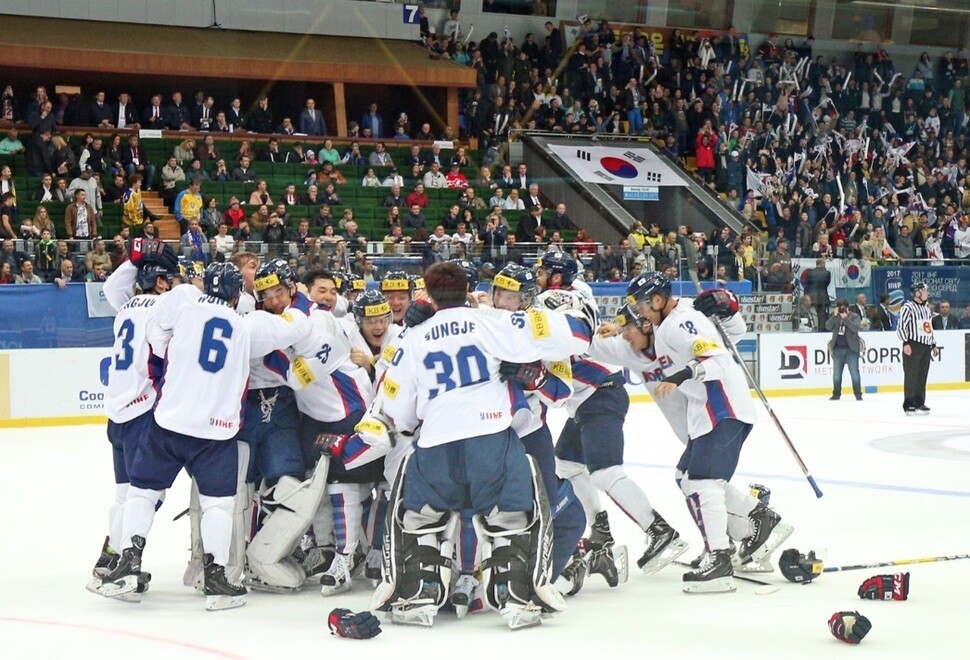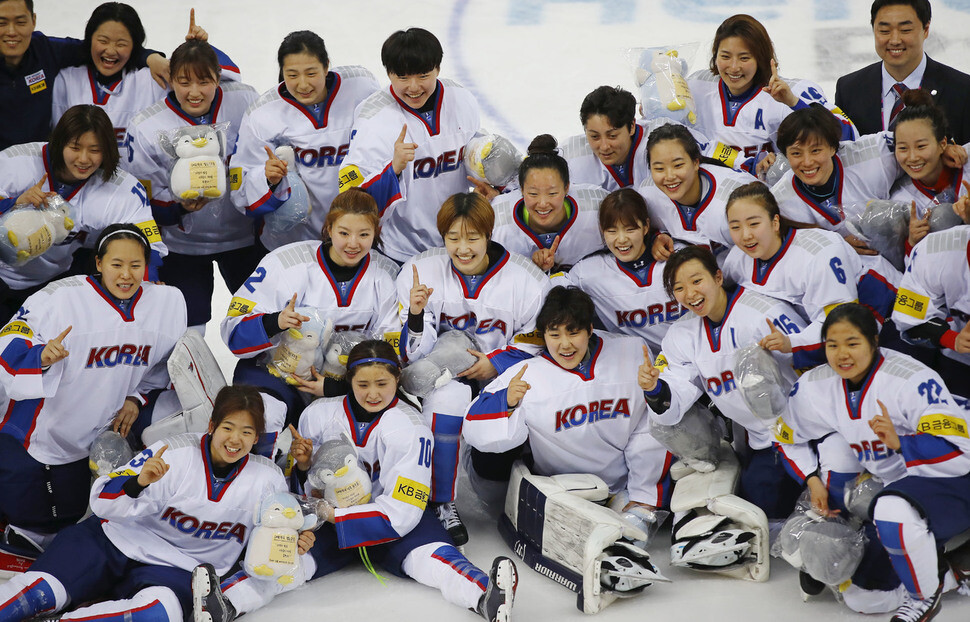hankyoreh
Links to other country sites 다른 나라 사이트 링크
Newly minted citizens to aid South Korea’s Winter Olympics efforts

Nineteen athletes altogether have been naturalized as South Koreans to compete on the South Korean national team in the 2018 Pyeongchang Winter Olympics – the most athletes to ever be naturalized for such a purpose. The sports world has truly entered a multicultural and multinational era.
As of Sept. 11, records maintained by the Pyeongchang Winter Olympics Organizing Committee on “special naturalization for outstanding athletes” in five categories showed that the most athletes (seven men and four women) had been naturalized in the category of ice hockey, followed by four in biathlon, two in skiing, one in ice dancing and one in luge. By nationality, there are eight athletes from Canada, five from the US, four from Russia, one from Norway and one from Germany. This is quite an increase from the 2014 Sochi Winter Olympics, when the only athlete to be naturalized as a Korean citizen was Kong Sang-jeong, a Taiwanese national of Korean descent who competed in the women’s short track.
Seven of the 25 athletes competing on the South Korean men’s hockey team are from other countries. “In ice hockey, it has become common for people to change their nationality to compete in the games. We also bowed to repeated recommendations from the International Ice Hockey Federation to recruit athletes from overseas because there are just 200 adult hockey players in the country,” said Yang Seung-jun, head of the Pyeongchang Olympics preparatory and planning team. “We weren’t able to recruit world-class athletes. But our homegrown athletes have learned a lot by training with these good-natured and hard-working athletes.”
The men’s hockey team managed to make it into the world championship this year partly because of the outstanding leadership of Korean-Canadian coach Paek Ji-seon (Jim Park), but also because the naturalized athletes didn’t hesitate to rough it up with the local athletes, who are the team’s top scorers. The team’s goal is to make it into the quarterfinals in the Pyeongchang Olympics.

Four of the 23 participating members of the women’s hockey team, under the lead of Canadian coach Sarah Murray, are naturalized athletes. Interestingly, all four of these athletes are of Korean descent. Park Eun-jeong, 28, and Danelle Im, 24, are Korean-Canadians who received dual nationality through their Korean ethnicity, while Park Yun-jeong, 25, was a Korean adopted in the US who has now regained her Korean nationality. They are joined by Randi Griffin, 29, whose mother is Korean. The goal of the women’s ice hockey team in the Pyeongchang Olympics is to win one match.
Four Russian athletes – two women and two men – were naturalized for the biathlon. “It’s an individual competition, but there are only around 50 adult athletes in the country. We just weren’t able to get ready for the Pyeongchang Olympics. We’ve naturalized a number of experienced Russian athletes so that we can compete on the world stage,” said a spokesperson for the Korean Biathlon Union.
In the women’s category, Anna Frolina, 33, and Ekaterina Avvakumova, 27, are likely to fill two of the four slots on the roster that South Korea has already secured. In the men’s category, Timofey Lapshin, 29, is expected to pass the qualifying rounds, which will be held in Jan. 2018. These four joined the national team, which consists of 15 men and women, last month on its off-season training in New Zealand, and they are currently doing summer training in Pyeongchang on roller skis.
“It won’t be easy for us to get within reach of a medal at the Pyeongchang Olympics. But training together is creating synergy. In their training, the naturalized athletes are also determined to look beyond this year’s Olympics,” said the Korean Biathlon Union spokesperson.
The Korea Ski Association has lined up Magnus Kim, 20, a national of Norway, and Lee Mee-hyun, 24, a Korean adoptee who grew up in the US. The two of them recovered their South Korean nationality by being given dual citizenship. Kim has his sights set more on the 2022 Beijing Winter Olympics than on Pyeongchang, while Lee is aiming for the top 10 in freestyle skiing and slopestyle.
“Mee-hyun, who was adopted when she was one year old, is currently training in New Zealand. Her cheerful personality makes her popular with the other athletes, and they have no problem communicating even though she doesn’t speak Korean. Magnus is training in Norway,” said a representative for the Korean Ski Association.
In addition, 24-year-old American Alexander Gamelin was given South Korean citizenship to compete in the Olympics in the areas of figure skating and ice dancing. Gamelin will be teaming up with Min Yu-ra, 22, at the Nebelhorn Trophy competition taking place in Germany at the end of this month with the hope of winning a ticket to Pyeongchang. In the luge, 25-year-old Aileen Frisch, who is from Germany, was naturalized for the Olympics. Frisch had a good chance of competing in the 2014 Winter Olympics after taking the gold medal in the 2012 Junior World Cup, but she didn’t make it onto Germany’s national team.
The number of naturalized athletes has increased because the interests of foreign athletes who dream of competing in the Olympics coincide with those of South Korea, which is short on athletes in the winter events. While some are uncomfortable with the idea of foreign-born athletes representing South Korea in the games, the boundaries between states and races in sports are crumbling – as is illustrated by Korean-born Viktor Ahn, who won several gold medals in short-track speed skating for Russia in the 2014 Winter Olympics.
“The central government and the local government put all their energy into winning the bid on the Pyeongchang Olympics Games and put off working to improve our athletic performance in the winter events. It has been an uphill battle for the weaker sports federations to improve their athletes’ performances. Recruiting and naturalizing a lot of foreign athletes was a desperate measure to boost performance, but it also reflects the international trend toward global citizenship,” said Ryu Tae-ho, a professor at Korea University.
By Kim Chang-keum, staff reporter
Please direct questions or comments to [english@hani.co.kr]

Editorial・opinion
![[Column] Park Geun-hye déjà vu in Yoon Suk-yeol [Column] Park Geun-hye déjà vu in Yoon Suk-yeol](https://flexible.img.hani.co.kr/flexible/normal/500/300/imgdb/original/2024/0424/651713945113788.jpg) [Column] Park Geun-hye déjà vu in Yoon Suk-yeol
[Column] Park Geun-hye déjà vu in Yoon Suk-yeol![[Editorial] New weight of N. Korea’s nuclear threats makes dialogue all the more urgent [Editorial] New weight of N. Korea’s nuclear threats makes dialogue all the more urgent](https://flexible.img.hani.co.kr/flexible/normal/500/300/imgdb/original/2024/0424/7317139454662664.jpg) [Editorial] New weight of N. Korea’s nuclear threats makes dialogue all the more urgent
[Editorial] New weight of N. Korea’s nuclear threats makes dialogue all the more urgent- [Guest essay] The real reason Korea’s new right wants to dub Rhee a founding father
- [Column] ‘Choson’: Is it time we start referring to N. Korea in its own terms?
- [Editorial] Japan’s rewriting of history with Korea has gone too far
- [Column] The president’s questionable capacity for dialogue
- [Column] Are chaebol firms just pizza pies for families to divvy up as they please?
- [Column] Has Korea, too, crossed the Rubicon on China?
- [Correspondent’s column] In Japan’s alliance with US, echoes of its past alliances with UK
- [Editorial] Does Yoon think the Korean public is wrong?
Most viewed articles
- 1[Column] Park Geun-hye déjà vu in Yoon Suk-yeol
- 2Thursday to mark start of resignations by senior doctors amid standoff with government
- 3N. Korean hackers breached 10 defense contractors in South for months, police say
- 4[Editorial] New weight of N. Korea’s nuclear threats makes dialogue all the more urgent
- 5Will NewJeans end up collateral damage in internal feud at K-pop juggernaut Hybe?
- 6Kim Jong-un expressed ‘satisfaction’ with nuclear counterstrike drill directed at South
- 7[Editorial] Japan’s rewriting of history with Korea has gone too far
- 8[Column] ‘Choson’: Is it time we start referring to N. Korea in its own terms?
- 9[Cine feature] A new shift in the Korean film investment and distribution market
- 10[Column] The clock is ticking for Korea’s first lady